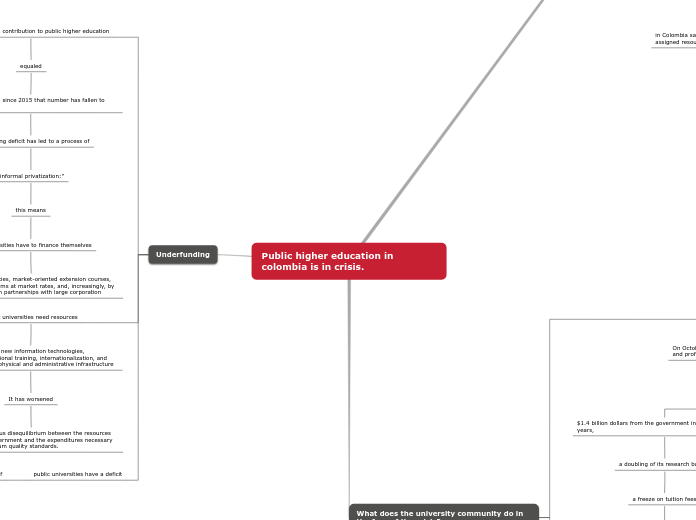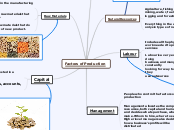Public higher education in colombia is in crisis.
Underfunding
public universities have a deficit
of
public universities need resources
the growing costs of new information technologies, laboratories, professional training, internationalization, and maintenance of the physical and administrative infrastructure
It has worsened
the already precarious disequilibrium between the resources provided by the government and the expenditures necessary to guarantee minimum quality standards.
the government’s contribution to public higher education
equaled
0.55 percent of GDP, since 2015 that number has fallen to 0.40 percent
The growing deficit has led to a process of
“informal privatization:”
this means
that universities have to finance themselves
by selling consultancies, market-oriented extension courses, and graduate programs at market rates, and, increasingly, by establishing research partnerships with large corporation
What does the university community do in the face of the crisis?
The state
threat
During those days Alejandro Palacio, quoted in the epigraph, a spokesperson for the student movemen
to protest
Since November 8, students, professors, clerical, and service workers have been joined by the public school teachers’ union (FECODE),
along
with the country’s progressive trade union federation (CUT), which has called for nationwide marches
On October 10, with the support of rectors, administrators, and professors, Colombia’s students called an indefinite strike
students are demanding
to re-open negotiations with the government, specifically with President Duque himself,
to
ensure the current semester will not be canceled, and to secure guarantees for the exercise of civil rights.
$1.4 billion dollars from the government in the course of ten years,
a doubling of its research budget
a freeze on tuition fees
the refinancing of student loans at a zero percent interest rate
preservation of funding for vocational and technical schools
respect for the right to protest and voluntary rather than mandatory accreditation
Colombia’s 1991 Constitution
Guarantees
Public education as a universal right
free
BUT
Articles 67-69
which state that the role of the Colombian state is to help individuals and families by regulating markets between public and private universities
private institutions are systematically favored
accreditation
based on
criteria for “academic excellence”, in order to create a fiction of a meritocracy in one of Latin America’s most unequal societies in the world’s most unequal region.
privatized
through
Imported from U.S. universities and pervasive in Colombian private universities
The job of the state, in this vision
is
to provide
property rights
subsidizing the entry of the poor intro competitive markets to determine quality as well as the ability to pay tuition and fees.
security
credit
commodified
what the students done to halt it
high-quality









